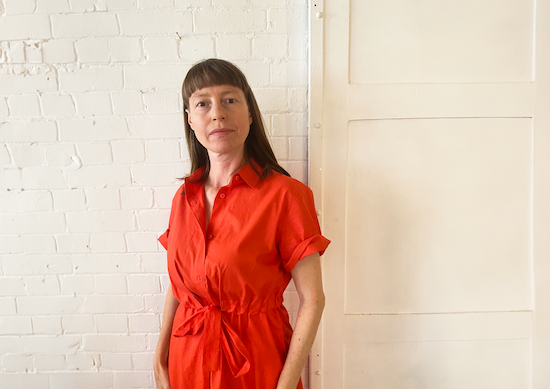Photo credit: Loula Yorke
The music of the spheres is a concept, a phenomenon, a theory that has been an inspiration to artists since Pythagoras proposed that the sun, the moon and all planets emit their own hum based on their orbital revolution. He proposed that the quality of life on earth is based on the reflection of that sound, but that it is imperceptible to the human ear.
That sound, or at least the idea of that sound, has inspired musicians and artists since the mid 500s BC right up to this moment and will continue ad infinitum (as long as we are here, and probably afterwards too). The theory is that there is a universal music that we tap into when creating. Johannes Kepler called it the Harmonia Mundi in the early baroque period (1600s). But basically it’s all about the loops. It’s all about tapping in. And this makes listening the new Loula Yorke album Volta all the more tantalising.
Tapping in to Volta, I wonder why are we so drawn to cycles? To loops, to patterns, to rituals? I guess the simple answer is that we are made up of these rituals. We live our lives at different speeds, but following the same desires and needs – warmth, shelter, nourishment (daily cycles) – and once we have those we look for something to hook ourselves onto: a feeling, a space where something repeats, but that is ever evolving, and revolving.
Yorke’s new release Volta is deeply cyclical. Out of each cycle new branches are grown which soon build into a forest. A rich forest. A rainbow seen through only a green filter with textures that come in and out of focus. The music on Volta is created from fragments and seedlings that mirror the freshly picked wild flowers that sit alongside the synths in Yorke’s Cottage Studio. Smooth, gnarly-edged, soothing, energising organic loops evolve from monophonic soundings. In Volta, Yorke set out to create a new body of music, giving herself more limitations than usual. She steps away from the purely improvised recordings which have featured strongly on previous releases (the albums Florescence, ysmysmysma and her live performances). The results are staggeringly rich.
The seven cycles or tracks of Volta are the result of a focused period of composition. Working every day from her Cottage Studio in rural Suffolk, Yorke funnelled her overactive mind into a routine of near-monastic study: every day the same, one piece at a time. Restricting her palette to a single set of modules, she set herself hard rules: no granular synthesis, no vocals, no drums. And, as a dedicated live performer, each piece had to be reproducible with minimal re-patching between tracks.
I was lucky enough to speak to Yorke about her studio (you can watch her in the Cottage Studio in her regular video offerings). Before she can make music she builds her fire, collects wild flowers from the garden to put in vases to make her studio a balance between the electronically powered synths and nature. It sounds like a dream, an idyllic space – which it partly is, especially if you edit out the reality of having to actually lug the wood in, and build and insulate the studio herself (with some help) on a tiny budget.
Yorke’s ethos is to rely on herself. You can hear it in the music. It is strong even in the softer passages, the ground basses. The mellifluous top lines are like a gold thread pulling the rest of the monophonic lines along. By layering the lines she creates a polyphony of ever shifting phrases, like a medieval quodlibet, combining patterns which have become familiar and which come around again and again to fit into another part of the track.
Every time I sat down to write about Volta, I just listened to the album over and over. I instantly forgot that I wanted to write about it, I just soaked it in. Volta lifts you up. It transcends time. It twinkles celestially and provides an earthy branch to sit on.
“You can’t play chords on a monophonic synth, you have to imply them,” Yorke notes, “The illusion of polyphony is created through deft use of delay and harmonics, leading to trance-like emotional heights”. Illusions and evolutions are key to Volta, like moving your bowing arm on a violin even after the note has finished. You think you hear something. There is a sound left behind (perhaps the music of the spheres).
In the second track ‘The Grounds are Changing as they Promise to Do’, the cracked earth is slowly moving, crumbling dry dusty soil is moving apart to let bright new roots emerge from their safe seedling nests. The new shoots break through, taking us into bright broad Suffolk skies. There is no hiding here and Yorke’s track is conversational and delicate with a strength and a solidarity that pushes forward, leading you, making you want to sit in the dusty soil and see what it will grow into. There is something baroque in the voicing of this music: the almost ostinato bass line and the ever changing higher voices, reiterating the cycles always with a slightly brighter perspective. I can only write, as anyone can, from their own musical reference points, and to me there is a universal gravitation towards the patterns of the high baroque period in this album.
The fifth track, ‘An Example of Periodic Time’, begins with a sweeping cycle of orchestral sounding instruments which ascend upwards from warm low-pitch bassoon to staccato twittering piccolos and back again. A wave of asymmetric call-and-responses echo throughout and cast a dreamy scattering of rhythmic play. It messes with the construct of time, until the sand runs out and the last few grains land softly. ‘Anecdoche’ sounds like tiny exploding stars, fireworks in a far away universe that gain momentum.
Throughout the album, Yorke’s music keeps bring to mind some of Hannah Peel’s Fir Wave, the Mercury nominated album that Peel created after being originally asked to remix a 1972 KPM library music album by the BBC Radiophonic Workshop which included the synth composing, playing and programming of Delia Derbyshire. Although relatively new, in the past five years Loula Yorke has created great waves and a solid path for herself, from playing underground warehouse parties, to the all night area at Glastonbury, to improvising live on stage with Snooker legend-turned synthesist Steve Davis, to performing at the the prestigious Snape Maltings concert hall, and from Cafe Oto to SARC in Belfast. Loula has supported The Orb and Talvin Singh.
Volta was composed, played and recorded live using only her modular synthesiser, and it will carry you through the darkness. The album feels like a release of something more than sound. It is the culmination of energy and trust that Yorke has built up in her own solo practice since 2019 in her Cottage Studio and out on the road.
There is a real feeling that the original Music of the Spheres or Musica Universalis, are in motion here. A sense based on the philosophical concept of a continuous musick that is created and based on the the movements of celestial bodies. If you can tap into the music of the universe, you are onto a good thing! Yorke is taking us from her Cottage Studio up through the skylight and out face to body with the celestial firmament. She keeps our feet firmly rooted and surrounded by Suffolk wildness but lets us drift upwards..
Volta is a pivotal moment in her output, and it coincides with a time where we need to listen to music that is uplifting, where the plants and trees form the root of the music. Volta is, as the medieval dance of the same name suggests, a ‘lift’, and you cannot leave the musical space of Yorke’s album without at least 70% more hope or joy than you started with. She takes you on a road trip that flits between paths overgrown with wild flowers and our earthy rotations. Wherever there is a break in the ground, there is room for something new to grow through, and Volta was made to soundtrack our movement into a new cycle.




